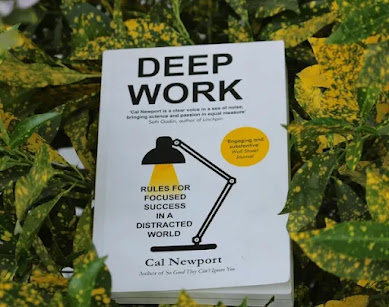Introduction:
In an age characterized by constant digital distractions and information overload, the concept of "Deep Work" has emerged as a powerful strategy to maximize productivity and focus. Coined by computer science professor and author Cal Newport in his book "Deep Work: Rules for Focused Success in a Distracted World," this methodology advocates for cultivating a state of deep concentration to produce high-quality work. In this review, we'll delve into the key principles of Deep Work and explore how it can revolutionize the way we approach our professional and personal tasks.
Key Principles:
Definition of Deep Work: Newport defines Deep Work as professional activities performed in a state of flow, with full concentration and zero distractions. This state allows individuals to leverage their cognitive abilities to produce valuable, high-quality output.
Four Disciplines of Deep Work: Newport introduces four disciplines to cultivate Deep Work: a. Work Deeply: Allocate specific time blocks for deep, undistracted work. b. Embrace Boredom: Train your mind to resist the constant urge for novelty and instant gratification, fostering patience and focus. c. Quit Social Media: Limit or eliminate the use of social media to reclaim time and attention for meaningful work. d. Drain the Shallows: Minimize shallow work (low-value, easily replicable tasks) to maximize deep work.
Deep Work vs. Shallow Work: Newport emphasizes the importance of distinguishing between deep and shallow work. While shallow work may be necessary, its overemphasis can impede meaningful accomplishments. Striking the right balance is crucial for sustained productivity.
The Importance of Routines: Establishing daily and weekly routines can aid in creating a conducive environment for Deep Work. By ritualizing your work habits, you train your mind to transition seamlessly into a state of deep concentration.
The Role of Technology: While technology can be a tool for productivity, Newport suggests being intentional about its use. Employ tools that enhance deep work, and be mindful of those that contribute to distraction.
Benefits of Deep Work:
Increased Productivity: Deep Work allows for the completion of complex tasks more efficiently, leading to a higher overall productivity level.
Enhanced Creativity and Innovation: The state of flow attained through Deep Work fosters creativity and innovation by enabling a deeper exploration of ideas and problem-solving.
Improved Work-Life Balance: By focusing intensely during designated work hours, individuals can achieve their professional goals more effectively, freeing up time for personal pursuits.
Conclusion:
Deep Work by Cal Newport serves as a timely guide for individuals seeking to thrive in a world besieged by distractions. By embracing the principles of Deep Work, we can reclaim our focus, boost productivity, and achieve meaningful success in our personal and professional lives. The journey toward a more productive and fulfilling existence begins with the commitment to working deeply in a world that often encourages the opposite.
Summary :
Deep Work by Cal Newport advocates for cultivating a state of deep concentration to enhance productivity and focus in a world filled with distractions. The book introduces key principles, including the definition of deep work, four disciplines (working deeply, embracing boredom, quitting social media, and draining the shallows), the distinction between deep and shallow work, the importance of routines, and the role of technology. Newport emphasizes the benefits of deep work, such as increased productivity, enhanced creativity and innovation, and improved work-life balance. Ultimately, the book provides a guide for individuals to navigate the challenges of the modern, distracting world and achieve meaningful success through focused, intentional work.




